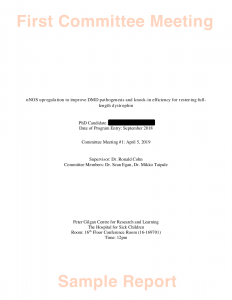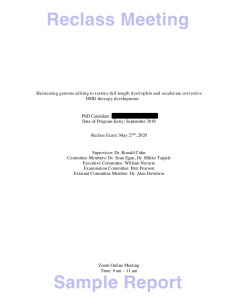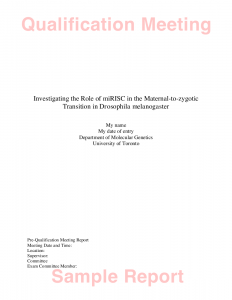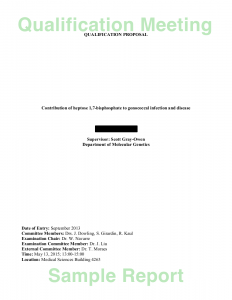This page provides information about First Committee Meetings, Reclassification Exams, and progress reports as written by members of the GSA. Information about Thesis Supervisory Committees can be found on Department of Molecular Genetics website. Samples of meeting reports were kindly provided by your fellow MoGen students.
If you are interested in submitting your old report as a resource for future students, please email the current GSA Webmaster!
FAQ
What is expected at my first Committee Meeting?
The first committee meeting functions mainly as a planning session. You will be expected to state the objectives of your research, know why the questions you are asking are important, how it will influence current knowledge in the field, and how you are going to approach these questions experimentally. A basic idea of how others in the field have used the approaches you are proposing to use (review articles are a great place to start) will also be expected.
Relax… this is not your defense and you aren’t supposed to know everything! Your committee will (probably) not try to scare you away but these meetings will become progressively less friendly (i.e. the bar will be raised and you will realize how little you actually know) as you progress towards writing your thesis or re-classing. When you are in front of your committee you should always stand-up—you’ll look and feel more confident!
What should my Committee Meeting progress report look like?
Formatting requirements can be found on the department website. In short:
- 2 cm margins
- Single-spaced, 12 pt Times New Roman
- Must have a title page, an abstract, references, and figures/tables—but these do not go towards your 4-page limit!
- What’s included in your 4 pages depends on which meeting you’re going into: for your first Committee Meeting, it’ll mostly be background, short-term goals (experiments planned) and long-term goals (what remains to be done to complete your thesis)
Submit your report as a single PDF to Sharepoint (requires you to log in with your UTORid).
What is expected of me at my Reclassification Exam?
A lot!
There’s no real way to get around this one. This exam is tough (many say it’s more stressful than their defense). You must have a really good handle on the literature in your field, and be able to think critically on your feet. As far as we can figure, the job of the examining committee is to find out what you don’t know (they care a lot less about what you do know) and so they will keep asking questions until they find out what you’ve missed. Just the same, don’t panic.
Ask your colleagues to read your proposal (your supervisor can only “edit”, not make specific recommendations) and get your labmates to give you a practice exam. You really have to get over the undergrad notion of “I am ready for the exam because I have read and understand everything that was taught this semester”, and move to the idea of “I have a pretty good handle on how this technique works, how it’s been used by others, and what I expect will happen when I do this experiment. So, I should be able to figure my way out of most questions that I am asked.”
Your reclassification proposal often sets the tone for you exam. The better written it is, the more smoothly your exam will go.
Examples of reports and research proposals
Sample reports are available below. By viewing or downloading them, you agree that the samples the GSA has compiled are to be used only as examples of formatting and sectioning reports. All MoGen students must abide by research ethics and UofT’s Code of Student Conduct; further resources regarding academic integrity can be found on the SGS website.
PI expectations and specifics about formatting may differ from lab-to-lab so get copies of old reports from students in your thesis lab!
Your report must be submitted 1 week before your scheduled meeting. Ensure that your PI or labmates have enough time to edit your draft and/or make recommendations, and that you have enough time to make changes before submitting it to Sharepoint.



